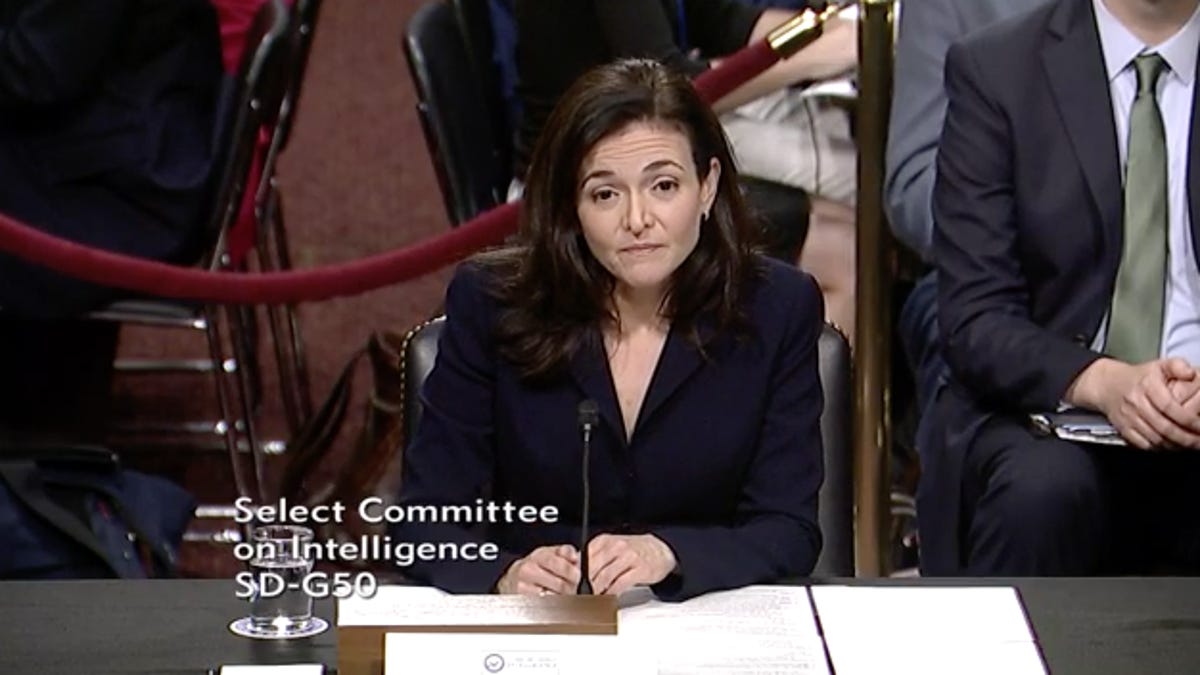For once, Facebook and Twitter didn't keep invoking AI as a cure-all
Artificial intelligence got only a few passing mentions, unlike the last few times the tech industry faced Congress.

Facebook Chief Operating Officer Sheryl Sandberg speaks before the Senate Intelligence Committee.
After playing a starring role at prior face-offs between Congress and the tech industry, artificial intelligence merely warranted a cameo in the latest round.
In the more than two and a half hours of testimony from Facebook Chief Operating Officer Sheryl Sandberg and Twitter CEO Jack Dorsey (Google was a no-show) before the Senate Intelligence Committee on Wednesday, the term AI specifically mentioned once, with a handful of references to machine learning or bots.
That stands in contrast with November, when Congress grilled executives from Facebook, Twitter and Google about Russian influence, as well as Facebook CEO Mark Zuckerberg's testimony before Congress over the Cambridge Analytica scandal, when AI was invoked as a sort of catch-all for the myriad of problems plaguing these social networks.
But Wednesday's session between Dorsey and Sandberg and the senators was far less combative and more collegial. Questions ranged from a look at the value of a customer's data to the tension between authentic and misleading information.
The temptation would be to mention AI, a system that can learn to identify potential fake news and squash at a scale that even an army of humans couldn't match. Zuckerberg in particular drew some criticism for over-using the term AI, which is both vague and highly technical, as a panacea for many problems facing the social networks.
Both executives were more restrained. Dorsey mentioned AI once when discussing how the company is figuring out how to track certain kinds of behavior. Sandberg didn't explicitly say AI, but referenced machine learning a handful of times, specifically to identify fake accounts, as well as deepfakes, or fake videos that look stunningly genuine.
Sen. Jack Reed, a Democrat from Rhode Island, referenced bots when asking about labeling fake accounts. Dorsey said he would consider identifying and labeling certain accounts as "bots," but didn't want to leave the impression that accounts without that label were automatically human.
"You can't have people assume everyone else is not a bot," Dorsey said.
During the second session with the House Committee on Energy and Commerce, Dorsey was specifically asked about the use of AI. He noted that the application of AI at scale is new, and that the company is starting to learn how to use it. He also talked about the need to explain and offer context around some of the decisions of these algorithms.
"We are offloading more and more of these decisions to this technology," he said.
Update, 1:36 p.m. PT: To include additional comments from Dorsey.
Cambridge Analytica: Everything you need to know about Facebook's data mining scandal.
iHate: CNET looks at how intolerance is taking over the internet.

